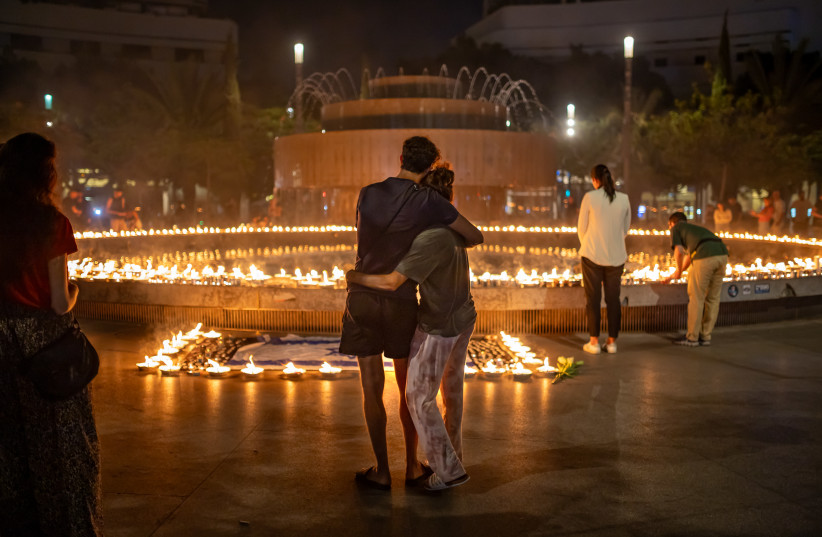The first anniversary of the October 7 massacre is upon us, and along with it comes the no-matter-what controversial task of deciding how it is to be honored.
No matter what, because the nation is not united; it is further apart than ever before. And no matter what is done, at least one side will be upset and one side will be pleased.
So, let’s look at some options here:
The first decision was when to commemorate the lives lost, the Israelis brutalized, the women and men raped, the families torn apart, and the hostages still in Gaza.
The obvious answer would have been October 7.

It is recognized universally as the October 7 massacre, the victims and the survivors identify with it, and it would give the Israelis memorializing the lives lost a mutual language with the international public to discuss the atrocities that occurred here one year ago.
However, the government decided in March to set the date of the annual memorial on the Hebrew date, thereby distancing the subject from those not active within the Jewish faith.
Most people globally, including many non-Jewish residents of Israel who were impacted by the attack, follow the Gregorian calendar rather than the Hebrew one.
October 7 is different
It is not uncommon for government memorial days and national holidays to be set according to the Hebrew calendar; it is standard. But October 7 is different.
A few thousand colloquially refer to that wretched Saturday as the “Simchat Torah massacre.” The entire world knows it as the October 7 massacre. Lest we forget, it wasn’t just Jews who fell victim to the atrocities of October 7. We would be further distancing our Druze brethren and our deeply valued and embraced non-Jewish immigrant population by tying this inherently to the Jewish faith.
But it isn’t even that because the memorial will not be on Simchat Torah – you cannot, after all, have a memorial on a Jewish holiday in a Jewish state.
Simchat Torah is on the 22nd of Tishrei, and the following day, the 23rd of Tishrei, is the second day of the holiday outside the country. Therefore, the day after that is when the memorial is set.
Is the disrespect to those who have fallen not written between those lines? Have they not been shoved aside symbolically here, much like the hostages still in Gaza have been?
This says something, both to the world and those on the ground, still suffering the consequences of the massive security failure of that weekend.
Regev controversy
Then, the even more controversial decision was made in August to make Transportation Minister Miri Regev in charge of the commemoration ceremony, leading hostage families to feel ostracized and, therefore, organize a separate event of their own.
“We will not allow our loved ones to be commemorated in a staged and artificial memorial event under the supervision of cynical politicians who shirk responsibility,” Yonatan Shamriz, brother of the late Alon Shamriz and one of the organizers of Kumu said following the announcement of the independent ceremony.
Regev then announced the decision to host the ceremony in Ofakim, which left many even more divided. Attempting to find a solution, President Isaac Herzog offered the Presidential Residence as an alternative location for the ceremony.
Regev declined, telling the right-wing Channel 14, “State ceremonies are not held at the President’s Residence. A state ceremony cannot take place there. It should be held in the South.”
Regev further sparked criticism from families of the victims and hostages when she referred to their disagreement with her state ceremony plans as “the background noise.”
Israel’s entertainment industry has not been quiet about which ceremony it supports, with over 20 major artists booked to perform at the families’ ceremony, not the governmental one.
In the meantime, several former hostages and families of hostages demanded that Regev not use their names during the October 7 state memorial ceremony.
The state is divided. When the survivors and families of victims do not want to be forcibly identified with the government’s ceremony, then they do not wish to be identified with the government itself.
So, on the one side are the government and the southern towns, and on the other are the hostage families and the kibbutzim, each choosing to commemorate the atrocity differently and with differing intentions.
So, which represents the people?
That’s the problem. There is no unity. Therefore, no ceremony represents us as a whole. We are a fractured nation being further divided by the controversial government.
Any argument for unity is a fallacy.
The writer is deputy editor-in-chief of The Jerusalem Post.
